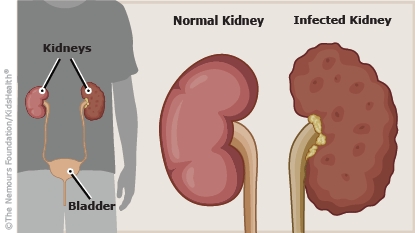A kidney infection — also called pyelonephritis (pie-low-nih-FRY-tis) — is caused by bacteria (a type of germ). One or both kidneys can be infected. This can happen when an infection in the bladder (where pee is stored before it leaves the body) or blood spreads to the kidney(s). Kids with a kidney infection usually have a fever, vomiting, and back pain. The infection is cured with antibiotics. Without treatment, a kidney infection can cause permanent kidney damage. So it's important to follow the health care provider's instructions carefully.



Your child:
You know your child best. If you see signs that worry you, call the health care provider right away.

Your child:

Could my child get another kidney infection? Kids who have had one kidney infection are more likely to get another one. So be sure to call your health care provider if your child gets symptoms of another bladder or kidney infection, such as a fever, belly pain, pain or burning when peeing, vomiting, or back pain.
What can help prevent another kidney infection? Preventing bladder infections (also called urinary tract infections or UTIs) can help prevent kidney infections. To help prevent bladder infections:
What happens if my child gets another bladder or kidney infection? Sometimes, getting a lot of bladder or kidney infections can be a sign that there's a problem with the kidneys, bladder, or other part of the urinary system. Your health care provider will talk to you about whether more medical tests are needed.